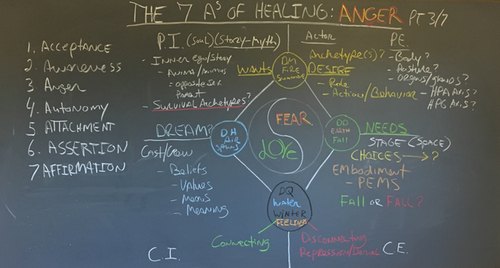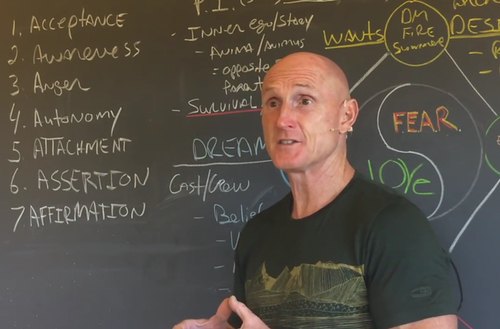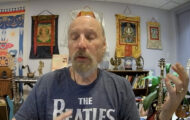The Seven A’s of Healing Part 3: Anger
Happy Thursday morning everyone!
Due to the devastating fires north of us, the local utility companies are taking greater steps to protect this part of California from a similar disaster, so that’s why this week’s blog is delayed just a bit more than I planned.
To be a spiritual person or practice spirituality means being connected to the greater whole. Part of that process includes anger, the subject of part 3 of my Seven A’s of Healing series based on Dr. Gabor Mate’s excellent book, When the Body Says No: Understanding The Stress-Disease Connection.
First, I’d like to highlight three short passages from Dr. Mate’s excellent book because they’re very relevant to what I’ll discussing this week on my blog and vlog.
The repression of anger and the unregulated acting out of it are both examples of abnormal release of emotions that are at the root of disease.
The repression of anger leads to a kind of boiling process within that can trigger chronic health and relationship problems. Nothing good comes from repressing anger. The more you repress, the more you compress.

In other words, repression equals compression. Ultimately, something’s got to go and that could be your heart and any gland or organ. It may even be your immune system.
In my experience, a lot of chronic health challenges related to autoimmune diseases are connected to commonly repressed emotions like anger.
The repression of anger

Another short passage to think about as you read this week’s blog and watch my much longer (one-hour) vlog, is Dr. Mate’s reference to the work of Dr. Allan Kaplan, a psychotherapist and researcher at the University of Toronto.
Referring to Dr. Kaplan, he points out that both repression and rage represent the fear of the genuine experience of anger.
When we’re talking about repression, people often repress what they’re afraid to express. That fear may be their own inability to manage themselves or how their anger might potentially wound or affect other people.
This common fail-safe signifies a far greater need for better communication skills and an improved understanding of the importance of anger.
On one hand, our greatest fear is the expression of rage, not unlike the grass fires north of us gone wild. Rage is what you get when you repress anger to the point where it can no longer be controlled and it becomes an unconscious manifestation of the demons and judgments that you hold within yourself.
On the other hand, if we can learn to express our anger in healthy ways, this alleviates the pressure of repression which leads to compression and, eventually, explosions like road range incidents and mass shootings we see in the news all the time. Tragedies like these are examples of people who have not had the support or education they need to learn how to express their anger in healthy ways.
Channeling your anger is healthy
One last quote from Dr. Mate’s book that is very important in this discussion of anger: Healthy anger is empowerment and relaxation.
Anger expressed in healthy ways can be empowering because we’ve had a chance to be honest about our feelings. Also, it’s relaxing because once we’ve shared what’s meaningful and important to us, it allows us to relax into our own truth… our own center.
Years ago, I was studying a comprehensive section on the importance of conflict for a course on effective business management. The course materials went to great lengths to show how avoiding conflict destroys the interconnectedness, productivity and, ultimately, the bottom line of any business.
Over my decades of work with clients facing a myriad of health obstacles, I’ve found that people are in a lot of pain because they’re repressing their feelings by avoiding conflict. Their justifications are many.
- I don’t want to be honest with my mother/father/coworkers.
- Nobody will like me.
- I’ll get fired.
When we think about conflict in healthier ways, however, we’re able to express our emotions openly and honestly. All of this works so long as we’re being genuine and not expressing our anger with words that are destructive to other people.
Judgment versus observation

In the realm of nonviolent communication, the late Marshall Rosenberg teaches that all judgments are expressions of unmet needs. Using words like woulda/shoulda/coulda or pointing the finger at somebody else are common examples of judgment.
When we’re talking about anger, it’s critically important to understand the difference between judgments and observations.
A judgment is something that separates you from another person. For example, if you tell someone they’re fat, you’ve separated yourself from that other person and you’ve created a reality the universe doesn’t support because oneness and unity are inherent in the universe (that’s a concept even backed by quantum physics!).
In addition to separating yourself from others and creating the illusion that something’s wrong with them — they are less than you — you’ll have to provide the energy to maintain those types of judgments too, as Arnold Patent implies in his Universal Principles.
Chronic fatigue and autoimmune disorders are examples of diseases that commonly happen to people who hold a lot of judgments against themselves and others, and don’t deal with them in healthy ways.
Over the course of an hour on my vlog, I’ll share my model for anger which allows you to see and understand the emotions that express love — the flow of energy and information through empathy to feel compassion and connections to your self and others — versus ones that are rooted in fear and disconnect you from people.
To that point, the late Zig Ziglar has a beautiful acronym for FEAR: False Evidence Appearing Real.
All too often, our culture does not possess or use good communication skills. We don’t have good communication training for children. We don’t have good training or parenting training for parents either. And, our teachers don’t have good communication skills.
My goodness, it’s amazing that we haven’t destroyed each other yet, especially when you really understand what effective communication can be.
Healthy expressions of anger
When you’re feeling an emotion rise up inside you, if you’re interested in personal, professional and spiritual growth, enhancing your relationships with others or healing yourself, ask yourself if this emotion you’re feeling is connecting you to that other person or creating a disconnect.
Take a deep breath…
Do you have the energy and the willingness to maintain the illusion of separation and are you absolutely sure that the judgment that you’re making against the other person is true?

In reality, you’ll never be absolutely 100 percent sure in the moment. When I use the term absolutely sure in a functional context, it means one of these things:
- Are you sure that you have the objective evidence to make the choice that you’re making?
- Is it positive to use anger?
- Is it wise to use any act of separation to achieve your dream or the stated dream of those involved (whomever that might be on your dream team)?
Generally, anger is an expression of fear, but it can also be conveyed in healthier ways, and in loving ones too.
It takes a fair bit of development to get to the point where you can realize that you can make an observation — stating what you can plainly see in kind, gentle ways — and know the difference between that and a judgment.
For example, describing a friend as looking overweight and appearing unhealthy is far, far different than calling him/her a “fat pig.”
The challenge for us as human beings is to maintain our connection to the person and orient our valuation of the situation to the action.
If we can still keep the flow of love happening without letting false evidence become real or acting in ways that are ultimately destructive, we’re that much closer to being healthier and happier consistently.
Moving forward
From there, I use my 4 Doctors model as well as information from my CHEK 4 Quadrant Coaching Mastery Program to help you begin to understand how to express anger constructively and without judgment.
Anger can be positive and grow relationships. In fact, it can be an important part of the healthy expression of conflict in a personal or professional relationship.
To do that, however, we have to stay completely connected to our values and pay attention to the world around us. We have to ensure that we’re always seeking meaning for all parties involved.
We must also be aware of how a judgment separates us from others and creates illusions that require us to maintain higher levels of energy that make us very, very tired.
By being honest about our anger in ways that are positive, we can decrease the pressure inside us. These things help us avoid repression and compression which, in turn, create problems like anxiety, depression, rage and, ultimately, disease.
I’ll see you a little earlier next week, when I’ll be talking about autonomy in part 4 of my Seven A’s of Healing series. If you need to play catch-up between now and next time, spend a few minutes watching parts 1 (acceptance) and 2 (awareness) of my series.
Love and chi,
Paul














Find me on the web